
Since finishing my PhD I’ve read lots of fiction again. Here’s a belated recap on books I read in the second half of 2017.
I wrote a blog post last year about getting back to reading fiction again after finishing my PhD, and reading novels in particular:
5 ways to catch up on reading novels

I use Goodreads to keep a track of things I’ve read, and especially to note the things that I would like to read, often when a book is mentioned by a friend, or I hear about something that’s being published soon — all the 2018 Booker Prize winners are in my ‘Want to Read’ list, for example. I’ve found it a really useful tool, brilliant when browsing in a bookshop to help me find something interesting that I’ll probably like — I’ve picked up several books that way.
Goodreads has a ‘reading challenge’ feature that I used to keep tabs on my progress across the year, a number of books to aim to read in a calendar year.
I set myself a modest reading target in 2017 of reading 20 novels in the year, knowing that:
a) I’m not a very fast reader,
b) work and family life is full, and so,
c) my reading each day would probably be limited the 10 minutes or so in bed before my eyelids drooped and the light had to be switched off.
I managed to hit my target with around 2 weeks left of the year, and was very pleased with myself.
This year, 2018, I thought I’d be a little bit more ambitious with my reading challenge and set it for 24 books in the year. That’s still slightly less than a book a fortnight, of course, and so still felt manageable within the constraints of life. Much to my surprise, I managed to hit my target on the 4th of September and I’m already onto book 30 (American Pastoral, by Philip Roth).
So, here below is a list, with some notes, on the books I’ve read since my post last year.
I’ve given each a star-rated vote. I’m aware that my ratings are weighted towards the top end, but that’s mainly, I think, because I don’t want to waste my time on books I feel I’m likely to not enjoy reading. So far this year there hasn’t been a book that I’ve been disappointed that I’ve read. One or two haven’t been as good as I’d hoped, but I’ve still enjoyed reading them.
…
The rest of 2017
Sapiens: A Brief History of Humankind
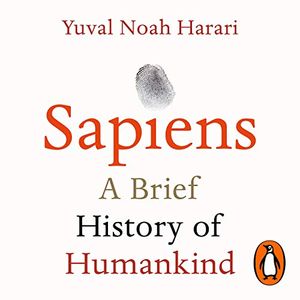
By Yuval Noah Harari
(audiobook)
★★★★☆
I’ve listened to very few audiobooks in my life, and this was my first real experience of it. I had some tokens for Audible.com available and, unsure of what to get, this book seemed like a good option — I’d heard lots of positive buzz about it. I got it in time to take on our family holiday in the summer, and listened to much of it whilst pottering in the kitchen cooking family meals and the like.
A stimulating and provocative high-level and long-timescale view of the history of our species, Homo Sapiens. By taking such a large-scale perspective, Harari is able to identify and assess the most significant developments in human history. His analysis of the significance, importance and impact of these moments are profound and had me in heated debate on them internally and with others. The high level view is not for all, the loss of detail and nuance being a significant problem in places. Nonetheless, I found this is a challenging and immensely rewarding read.
Winter in Madrid
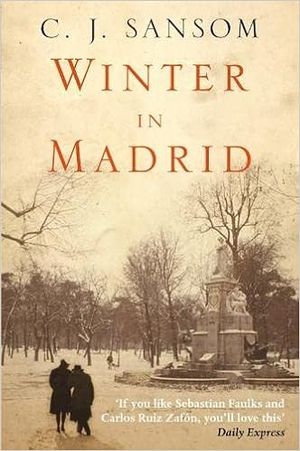
By C.J. Sansom
★★★★☆
Sansom is most famous for his Shardlake series, I believe, though I’ve not read any of them. A second-hand copy of Winter in Madrid sat on our bookshelves for years without being picked up, but I was so glad that I read it. It’s an historical thriller set in Spain immediately after the Civil War, a reluctant British spy, a British man who had fought against Franco and is now a prisoner of war, his former lover who is trying to find him and her husband, a shady businessman. The book accelerated as the predicaments of each of the characters became more precarious and more perilous until the high tension conclusion. I really enjoyed reading it.
Homage to Catalonia

By George Orwell
★★★★☆
I decided to read Homage to Catalonia next for two reasons. Firstly, I was inspired by Winter in Madrid and curious to find out more about the British who went to fight against fascism in the Spanish Civil War.
Secondly, though, I had watched a BBC Storyville documentary film called ‘Accidental Anarchist: Life Without Government,’ by Carne Ross, a career diplomat who resigned over the Iraq war and went on to found Independent Diplomat, a non-profit advisory group in the world of diplomacy.
In the film, Ross argued assertively against widely held assumptions that anarchism is a practical impossibility, citing Spanish civil war-era Catalonia was a shining example of working anarchism, amongst several other examples (His TED talk on the same subject is at: https://www.youtube.com/watch?v=2Hc2_jY4KhY).
This made me curious to find out more, and Orwell’s famous book seemed an obvious source.
In fact, Orwell writes frustratingly little about Catalan life in the era, which I guess is what I had been looking forward to reading. The book, instead, is more about his experiences in the militia. But his writing is profoundly humane of the facets and factions in the fight against fascism, and especially of the hopes and betrayals in the name of expedience of the successful anarchist social experiment that Carne Ross had described.
The Essex Serpent
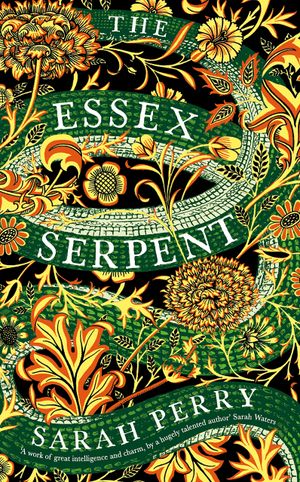
By Sarah Perry
★★★★★
A mesmerising story told in beautiful language to match the beauty of the book’s wonderful cover. Cora Seaborne, a modern, independent widow in Victorian London, befriends Will Ransome, a rural Essex parish vicar. Ransome’s parish is beset by tales of the Essex Serpent, casting a spell over his parishioners, and Cora and Will challenge and surprise each other as they slowly uncover the truth behind the myths and maybe fall for each other as well.
I’m a sucker for a novel where the reading of it is a sensory experience itself, and the language of Perry’s book had me within the first few paragraphs.
The New Life
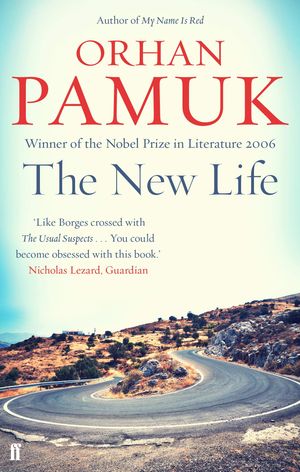
By Orhan Pamuk
★★★★☆
Orhan Pamuk is one of my favourite authors. This story is a variant on one of Pamuk’s persistent themes, a young man who falls in love with a woman who is out of his reach, for one reason or another. The opening line of The New Life is brilliant: ‘I read a book one day, and my whole life was changed.’ And so the student, Osman, who yearns for the life promised in this magical book, abandons his studies, his family and his home and sets off on a series of bus journeys to find the young woman, Janan, he has fallen in love with and the new life of his visions.
I got a little lost in places in the middle, losing the book a star, but Pamuk’s postmodern writing and the layers and spirals of plots and events can tend to that happening. The language, as always, was absorbing, though, and simply following on through was a delight.
The Remains of the Day

By Kazuo Ishiguro
★★★★★
I can’t believe I’ve never read this before. What have I been doing? A sublime story of restrained life in service in England between the two Great Wars and of overpowering duty to the master of an English Great House. Stevens, former butler to Lord Darlington, takes a rare holiday into the English countryside and into his own past and memories, and comes to understand he must try to make up for lost time and lost opportunities.
Stevens’s dedicated life of self-restraint in preference for Lord Darlington and his guests forced him to repress both his consciousness of Darlington’s political and social manoeuvres and his perception of the feelings of those around him, especially his father and the House’s housekeeper, Miss Kenton. Now he must try to understand and to make amends.
The Dalkey Archive
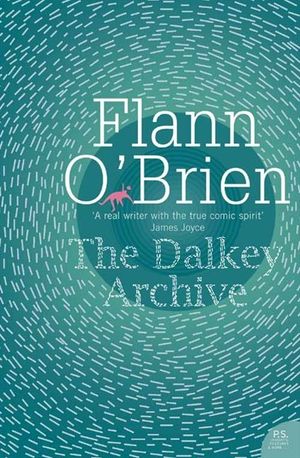
By Flann O’Brien
★★★★☆
Mad scientist and theologian, De Selby, plots to destroy the world by removing all the oxygen from the air. Only a civil servant, Michael Shaughnessy, and James Joyce himself, alive and well and working in a bar, can foil De Sleby’s plans. The Dalkey Archive is a companion book to Flann O’Brien’s earlier novel, The Third Policeman, written apparently because O’Brien was unable to find a publisher for his earlier work. De Selby appeared in The Third Policeman, though only by reference (and largely in brilliantly surreal footnotes and quotations from imagined works by de Selby [with the variant spelling in each book]), and The Dalkey Archive also includes the fabulous quantum theory of bicycles. I really enjoyed this book enormously, full to the brim with fantastic goings on and wild humour, but The Third Policeman is in my all-time top 5 — its ending is superb, one of the best I’ve ever read. Better to read both, but if you’re only going to read one of the two, read that.
Any Human Heart

by William Boyd
★★★★★
For quite a while now, I’ve been encouraged by a colleague, friend and reading buddy, Steve Parks, to read William Boyd, and this is my first William Boyd, on Steve’s recommendation of the best place to start.
Any Human Heart is an utterly astonishing work, a superbly plotted plotless book that had me riveted and enraptured on every page. Logan Mountstuart is so well drawn as a character that I cared desperately about every moment of his sweet, painful life. The other major and minor characters seemed utterly plausible, and I ended up ‘just checking’ a number of the incidental characters on Wikipedia, so deftly woven are they with other actual historical characters. Brilliant!
I am now hooked after this, my first William Boyd novel, and I’m really looking forward to reading more by this astonishing author.
…
So, that’s how far I got in the rest of 2017. A forthcoming blog will have reviews of the books I’ve read in the first half of 2018.
I’d also love to have any recommendations of must-read books or authors. You can see the kind of thing I tend towards from the above and in the previous blog or on my Goodreads ‘Read’ books list.
Send me a suggestion on mstdn.social/@joesb on Mastodon or on @joesb on Twitter.